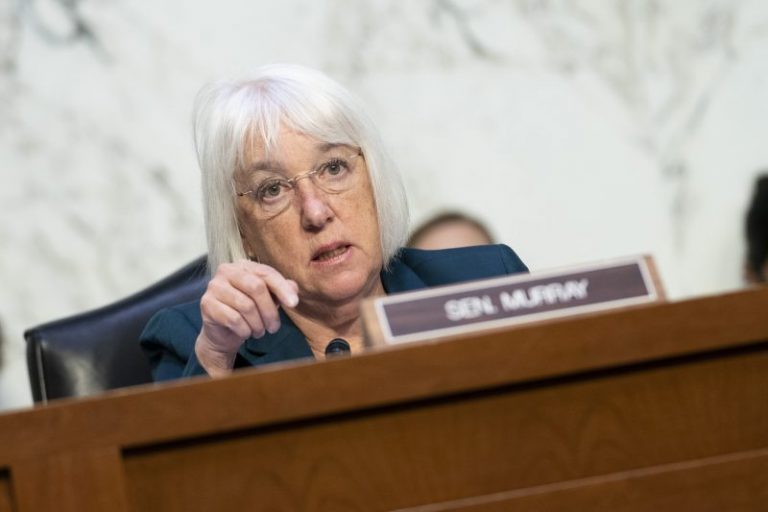Congress has clinched a deal to avert a lapse in critical dollars for Puerto Rico’s Medicaid program for five years and permanently beef up federal dollars for the other U.S. territories, according to two people familiar with the negotiations.
They spoke on the condition of anonymity to describe the negotiations.
The safety net program is funded differently in the states than it is in the U.S. territories, requiring Congress to periodically re-up certain dollars the federal government provides to their Medicaid programs. The beefed up dollars the territories receive are set to lapse at the end of the week without action from Congress.
The measure is just one of several big-ticket Medicaid and pandemic-related items congressional negotiators are planning to include in a sweeping package to fund the government through September, such as ending a measure that has prevented states from kicking people off Medicaid during the pandemic and avoiding coverage losses for new moms and children.
Failing to pass a deal could lead to severe cash flow problems for the territories’ Medicaid programs, raising the specter of cuts to optional benefits and reduced payments to hospitals.
The agreement, which has not been publicly released, would continue the rate the federal government has been paying to match Puerto Rico’s Medicaid dollars for five years, as well as the higher limit on the money the federal government can put toward the island’s safety net program, according to the people familiar with the negotiations. It would permanently extend the federal match rate for the other U.S. territories’ Medicaid programs at 83 percent.
To pay for the change, lawmakers would get rid of a controversial Biden administration move, according to one congressional aide. There is a cap on the amount of money the territories’ Medicaid programs can receive from the federal government each year. The Biden administration last year interpreted language from recent laws to mean the federal government could give at least $2.9 billion per year to Puerto Rico’s fragile safety net program.
But the Government Accountability Office has said the administration’s interpretation was wrong, and Republicans have been itching to get rid of the move. Killing the increased funding permanently — though continuing it for at least another five years — appears to count as a cost saver, providing a way to offset a five-year extension.
Meanwhile, the legislation would begin to end a measure that has prevented states from kicking people off Medicaid during the pandemic.
States would be allowed to start reevaluating who is still eligible for the program beginning in April — a key priority for Republicans — with guardrails over how they can do so. The bill also includes some long-sought Democratic policies, such as allowing states to permanently extend postpartum Medicaid coverage for 12 months and barring children from getting kicked off Medicaid or the Children’s Health Insurance Program for a continuous 12 months, even if a family’s income fluctuates, according to one person familiar with the negotiations.
A sweeping pandemic preparedness bill also made the cut.
Congress is expected to include the bulk of a plan to better prepare the country for the next pandemic in a sweeping package to fund the government through September, according to multiple people familiar with the negotiations who also spoke on the condition of anonymity to describe private deliberations.
But the legislation probably will not include an effort to establish an independent task force to probe the U.S. response to the pandemic amid a slew of partisan investigations in both chambers.
In January, the leaders of the Senate Health, Education, Labor and Pensions Committee — Sens. Patty Murray (D-Wash.) and Richard Burr (R-N.C.) — released their bipartisan plan to overhaul the country’s pandemic strategy, which included measures to improve disease data collection, bolster oversight of health agencies and establish a government panel modeled after the 9/11 Commission that would probe the origins of covid-19 and the resulting federal response.
Most of the legislation, known as the Prevent Pandemics Act, will be included in the government spending bill Congress could release as soon as today. Axios first reported the news. The bill is expected to include a measure requiring the Senate to confirm the director of the Centers for Disease Control and Prevention, according to a Senate GOP aide. However, the measure requiring lawmakers representing both parties to choose a 12-member task force to probe the pandemic response will not be included in the package. The final text of the government spending package has not been released, meaning some provisions could still shift.
Burr and Murray had been pushing congressional leadership hard to include their pandemic bill in any year-end package, believing it would be more difficult to get passed next year. The legislation has added significance for Burr, who is planning to retire and wants to further cement his legacy on pandemic preparedness legislation. And the prospects for sweeping bipartisan legislation next year are dim, with Republicans controlling the House.
Some advocates and experts have said the bill is simply a down payment on what is needed to bolster the nation’s defenses for the next pandemic. In two recent reports, Democratic congressional investigators called for significant investments and large-scale changes to the nation’s pandemic response, such as increasing public health funding, clarifying federal agencies’ roles during an emergency and boosting the nation’s stockpiles of medical and protective supplies.

